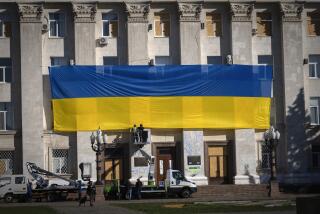Kurds see historic opportunity in northern Iraq
- Share via
Reporting from MAKTAB-KHALED, Iraq — The fighter leaned on the wall of the prefabricated hut, enjoying a rare moment of respite from the afternoon sun beating down on this drab forward outpost.
Although the concrete barriers around him bore depictions of the Iraqi flag and the signs (some glorifying the Iraqi army) were in Arabic, the army was nowhere to be seen.
The fighter, who was not authorized to give his name, was a member of the peshmerga, the Kurdish militia that took over the army’s positions in Iraq’s northern provinces after the ignominious retreat of government troops last week in the face of an offensive by an Al Qaeda splinter group, the Islamic State of Iraq and Syria.
Of the Iraqi army, he said: “These guys are cowards.... They just turned tail and ran.” His relaxed demeanor abruptly vanished when he was asked whether the Kurdish region would ever again be subject to Iraqi government control.
“Over our blood,” he said.
The outpost, about nine miles south of the city of Kirkuk on the road leading to Tikrit, is one of many areas in northern Iraq that have fallen into peshmerga hands. It is in an area that has been the subject of bitter debate between the Kurdish regional government, which administers the semiautonomous Kurdish areas to the north, and the Iraqi government in Baghdad.
The stunning collapse of the Iraqi army last week in the northern city of Mosul changed all that, however. Fleeing soldiers deserted their posts, abandoning U.S.-supplied equipment given to them to fight the very Sunni insurgents who were overrunning their positions. Many were themselves Sunni Muslims unwilling to fight for an army they viewed as little more than a Shiite militia for Prime Minister Nouri Maliki.
“There were Sunnis in the army, but all the officers were Shiite, and they were persecuting them, so that’s why they didn’t do anything,” explained a peshmerga officer who gave his name only as Lt. Col. Latif. Once Mosul fell, and the Iraqi army abandoned its posts near Kirkuk, “we were told by the Kurdistan political leadership to go forward and take over those areas,” Latif said.
Whatever the reason behind the army’s withdrawal, there is little argument that the Kurds — who have long dreamed of independence, and who consider this area to be rightfully theirs — see this as a historic opportunity. Peshmerga forces have reportedly taken territory in Nineveh, Salahuddin and Diyala provinces. Especially in the prized province of Kirkuk and the oil fields of Khanaqin, roughly 100 miles southeast, there is a growing sense that the gains are irreversible.
Kurdish claim over these lands is rooted in simple demographics. Although the Iraqi government says that Arabs and Turkmens form the majority, Kurds insist that Kirkuk city has a Kurdish majority — despite the forced expulsion of the Kurds under dictator Saddam Hussein and the resettlement of Arab families, known as “Arabization,” between 1991 and Hussein’s fall in 2003.
Besides, Kurdish officials argue, with the looming specter of an invasion by the Islamic State of Iraq and Syria, residents want the peshmerga to protect them.
“For the first time, the provincial council of Kirkuk, Arabs and Turkmens are unanimously asking peshmerga to be there. So should we be there or not?” asked Hemin Hawrami, head of foreign relations for the Kurdistan Democratic Party. The areas that are newly under peshmerga control, he insisted, are geographically and historically part of Kurdistan.
Bulos is a special correspondent.
More to Read
Sign up for Essential California
The most important California stories and recommendations in your inbox every morning.
You may occasionally receive promotional content from the Los Angeles Times.














